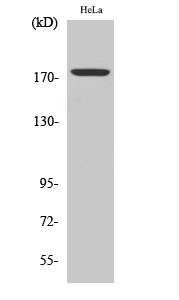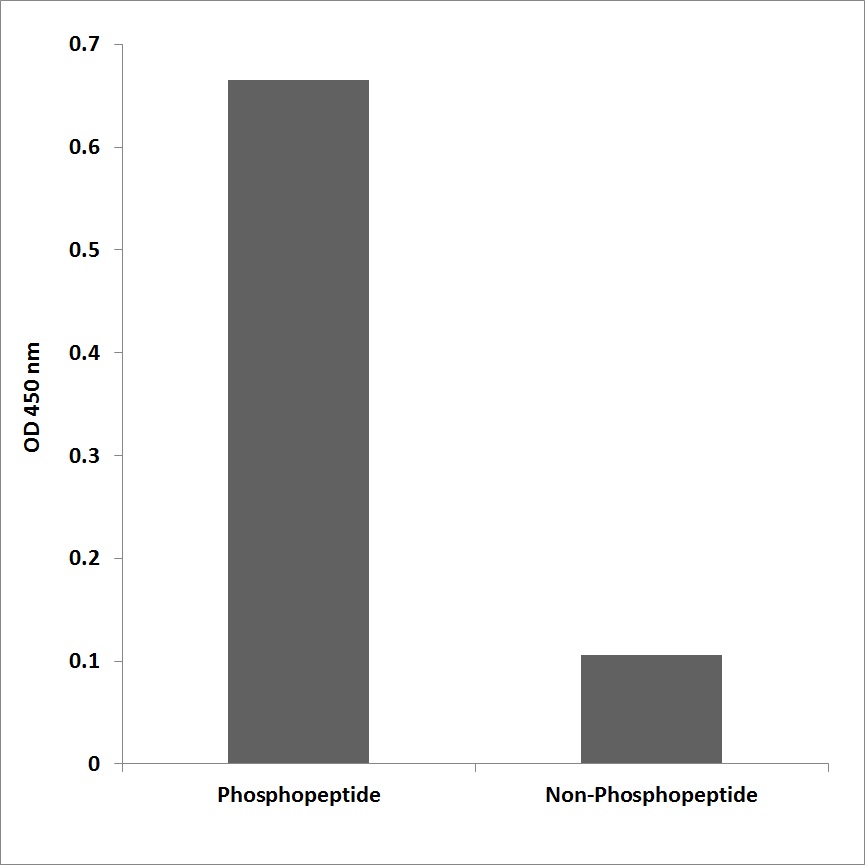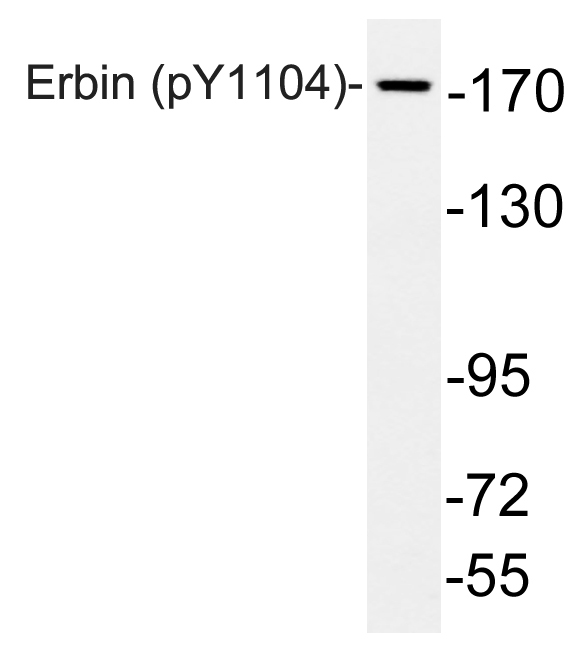Erbin (phospho Tyr1104) Polyclonal Antibody
- Catalog No.:YP0099
- Applications:WB;ELISA
- Reactivity:Human;Rat;Mouse;
- Target:
- Erbin
- Fields:
- >>NOD-like receptor signaling pathway
- Gene Name:
- ERBB2IP
- Protein Name:
- Protein LAP2
- Human Gene Id:
- 55914
- Human Swiss Prot No:
- Q96RT1
- Mouse Swiss Prot No:
- Q80TH2
- Immunogen:
- Synthesized phospho-peptide around the phosphorylation site of human Erbin (phospho Tyr1104)
- Specificity:
- Phospho-Erbin (Y1104) Polyclonal Antibody detects endogenous levels of Erbin protein only when phosphorylated at Y1104.
- Formulation:
- Liquid in PBS containing 50% glycerol, 0.5% BSA and 0.02% sodium azide.
- Source:
- Polyclonal, Rabbit,IgG
- Dilution:
- WB 1:500 - 1:2000. ELISA: 1:10000. Not yet tested in other applications.
- Purification:
- The antibody was affinity-purified from rabbit antiserum by affinity-chromatography using epitope-specific immunogen.
- Concentration:
- 1 mg/ml
- Storage Stability:
- -15°C to -25°C/1 year(Do not lower than -25°C)
- Other Name:
- ERBB2IP;ERBIN;KIAA1225;LAP2;Protein LAP2;Densin-180-like protein;Erbb2-interacting protein;Erbin
- Observed Band(KD):
- 172kD
- Background:
- This gene is a member of the leucine-rich repeat and PDZ domain (LAP) family. The encoded protein contains 17 leucine-rich repeats and one PDZ domain. It binds to the unphosphorylated form of the ERBB2 protein and regulates ERBB2 function and localization. It has also been shown to affect the Ras signaling pathway by disrupting Ras-Raf interaction. Alternatively spliced transcript variants encoding multiple isoforms have been observed for this gene. [provided by RefSeq, Nov 2011],
- Function:
- function:Acts as an adapter for the receptor ERBB2, in epithelia. By binding the unphosphorylated 'Tyr-1248' of receptor ERBB2, it may contribute to stabilize this unphosphorylated state.,sequence caution:Contaminating sequence. Potential poly-A sequence.,similarity:Belongs to the LAP (LRR and PDZ) protein family.,similarity:Contains 1 PDZ (DHR) domain.,similarity:Contains 17 LRR (leucine-rich) repeats.,subcellular location:Found in hemidesmosomes, which are cell-substrate adhesion complexes in stratified epithelia. In transfected cells, either diffusely distributed over the cytoplasm or concentrated at the basolateral membrane.,subunit:Interacts with ERBB2, BPAG1 and ITGB4. May favor the localization of ERBB2, by restricting its presence to the basolateral membrane of epithelial cells. Also found to interact with ARVCF and delta catenin.,tissue specificity:Highly expressed in brain, hea
- Subcellular Location:
- Cell junction, hemidesmosome . Nucleus membrane . Basolateral cell membrane . Found in hemidesmosomes, which are cell-substrate adhesion complexes in stratified epithelia. In transfected cells, either diffusely distributed over the cytoplasm or concentrated at the basolateral membrane. Colocalizes with the adrenergic receptors, ADREN1A and ADREN1B, at the nuclear membrane of cardiac myocytes (By similarity). .
- Expression:
- Highly expressed in brain, heart, kidney, muscle and stomach, followed by liver, spleen and intestine.
- June 19-2018
- WESTERN IMMUNOBLOTTING PROTOCOL
- June 19-2018
- IMMUNOHISTOCHEMISTRY-PARAFFIN PROTOCOL
- June 19-2018
- IMMUNOFLUORESCENCE PROTOCOL
- September 08-2020
- FLOW-CYTOMEYRT-PROTOCOL
- May 20-2022
- Cell-Based ELISA│解您多样本WB检测之困扰
- July 13-2018
- CELL-BASED-ELISA-PROTOCOL-FOR-ACETYL-PROTEIN
- July 13-2018
- CELL-BASED-ELISA-PROTOCOL-FOR-PHOSPHO-PROTEIN
- July 13-2018
- Antibody-FAQs
- Products Images

- Western Blot analysis of various cells using Phospho-Erbin (Y1104) Polyclonal Antibody

- Enzyme-Linked Immunosorbent Assay (Phospho-ELISA) for Immunogen Phosphopeptide (Phospho-left) and Non-Phosphopeptide (Phospho-right), using Erbin (Phospho-Tyr1104) Antibody

- Western blot analysis of lysates from HeLa cells, using phospho-Erbin (Phospho-Tyr1104) antibody.



